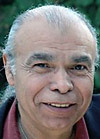Choctaw Bahais
The first Choctaw Baha'i is believed to be Helen Henry who declared as a Baha'i between 1957-58. If anyone has more information please contact me at talismanart@gmail.com

Phil Lucas Choctaw Baha'i declaration date is unknown at this time.
Phil Lucas was born in 1942 and died in February of 2007. He was very loved and will always be missed. The following is from his obituary in the Seattle Times.
Phil Lucas, 65, taught filmmaking at BCC.
On movie and television screens, where Native Americans were often portrayed as primitive warriors or passive sidekicks, Phil Lucas stood tall.
While the Issaquah filmmaker was one of the first American Indians to find national acclaim behind the camera, he wasn't interested in just shattering stereotypes. He showed Native people as they really were — their struggles and successes in a country that is still coming to grips with its history.
Mr. Lucas died Sunday (Feb. 4) after developing complications from heart surgery. At the age of 65, he had written, directed or produced more than 100 films, TV series and documentaries — and touched thousands of lives.
Lucas taught film at the Institute of American Indian Arts in Santa Fe, N.M., and the University of Lethbridge in Alberta, Canada. For the past eight years, he was a film instructor at Bellevue Community College (BCC), where he founded an American Indian Film Festival in 2003, providing a welcome forum for Indian filmmakers.
His students are working around the country. "He was the kind of guy who you wanted to run back to and tell about your success," said Travis Sterner, who runs a film-production company in Bellevue.
Mr. Lucas won an Emmy in 1994 for co-directing "The Native Americans" on TBS, did several projects for PBS and was honored at several film festivals.
One of his most memorable films was "The Honour of All," which tells how the Alkali Lake band of Indians in British Columbia overcame decades of alcohol abuse. Their village was 100 percent alcoholic in the 1960s but was almost entirely sober 20 years later, said Gary Robinson, Lucas' production partner and close friend.
The film "was the most powerful thing you'd ever want to see," Robinson said.
Mr. Lucas was born in Phoenix, and as a young Choctaw he saw signs posted in rural towns reading, "No dogs or Indians allowed." Such early prejudice helped inspire his film career, Robinson said.
"He worked toward racial equality in any way he could." He received a visual-communications degree from Western Washington University and traveled the world before settling in Issaquah. He was a musician in New York, an advertising agent in Honduras and a freelance photographer in Nicaragua, where he lived through the 1972 earthquake that devastated the capital city of Managua.
He's "probably lived his life more than any 90-year-old," said his son, Jessy Lucas, of Issaquah.
With boundless energy, Mr. Lucas juggled his film projects, teaching, family and an active role in the Issaquah chapter of the Baha'i faith. He "was fierce as a father and protector," and helped a long line of friends with advice, shelter and guidance, Robinson said.






